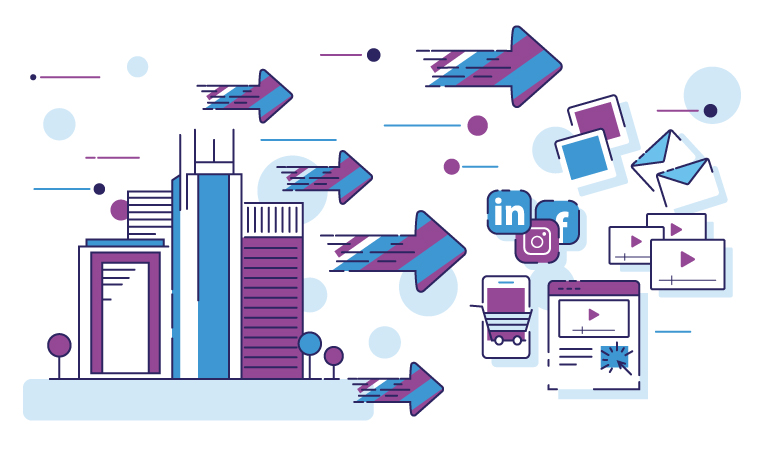One of the reasons I enjoy participating on panels with people I’ve never met before is that the other panelists inevitably share an experience or express an opinion that challenges my own. Throughout the discussion, things usually go in directions that would generally remain unexplored if not for the diversity of ideas being articulated. Panels, where you can simultaneously learn and contribute, feel natural and collaborative in a way that reminds me of the vigorous art school critiques I had in undergrad.
Recently, I spoke on a virtual panel with several other professional transformation and innovation practitioners. The discussion focused on the ripple effect that COVID-19 has had on our organizations and the clients we all serve, specifically as it relates to change management, transformation, and innovation initiatives. These are relatively complex topics, and even with over an hour, we barely scratched the surface on any of them. With that in mind, I decided to expand on some of the thoughts in more detail.
Mindset Shifts During a Pandemic
The first topic we discussed centered around the mindset shifts and impacts we’ve seen this year. The initial discussion focused on business and processes, but I found myself contemplating people. Specifically, I was considering the effects our evolving perspectives have had during the different phases of the pandemic. This year, everyone was forced to transition from a pre-pandemic mindset of “business as usual” to one of turmoil and change. Of course, I’m generalizing, but I think the mental models we use to help us cope with stress and change as humans reflect how our organizations ultimately react to the same pressures.
When the pandemic forced businesses to shut down or go remote, many of us found ourselves setting up workable home offices in kitchens and laundry rooms. Not ideal, but it only needs to last for a month or two, right? Wrong. What came after was a second scramble as organizations took steps they were initially hoping weren’t needed and started thinking about how they would adjust. Many of those adjustments involved leaning into digital, a place many of the groups were already behind in.
Opportunities in Times of Disruption
That shift in mindset pushed the panel discussion right into our second topic: Where is the opportunity for organizations? Frankly, I don’t believe it’s the emergence of new opportunities as much as a realization that they can no longer afford to ignore the trends we all recognize. New digital opportunities present themselves every day for organizations that are looking for them. But for those that have been ignoring these trends, it’s time to play some strategic catch-up.
This year, we’ve seen an explosion of digital growth in the marketplace. Organizations have had to focus on the experiences and support they offer customers and clients when they can’t do business face-to-face. For many, this is an entirely new way of engaging. We’ve also seen organizations reinvent themselves overnight, and others rethink the way they monetize their services. The panel collectively agreed that this current period of upheaval could set the stage for remarkable reinvention and progress, but the stress it causes isn’t sustainable.
Initial success can make it easy for organizations to believe they can continue operating short-staffed and overworked until fatigue catches up. I worry that many individuals also mistakenly believe they can handle that type of situation indefinitely and don’t realize how burnt out they are until it’s too late.
Failures and Learnings in 2020
And with that thought, we pushed into the portion of the panel I was the most interested in: failures we’ve experienced in 2020. We started by focusing on ourselves and our internal organizations, which seemed only fair. We reacted too slowly, or we underestimated the impact of things. These might be common themes that everyone can relate to in hindsight. I believe we all failed to understand the toll that such an extended period of uncertainty and isolation would have on us individually, especially if we expected it to be over months ago.
When the conversation turned to our clients, I voiced the first and greatest failure I had seen more than any other: paralysis. I likened it to the videos we’ve all seen of goats getting scared, freezing up, and tipping over. So many organizations simply froze or paused all of their strategic initiatives. They froze and waited, and then they waited a bit longer because everything had to go back to normal soon, right? For every organization that pivoted immediately and found a way around their challenges, just as many froze.
So, don’t freeze! Alright, now what?
Working Toward Digital Transformation
The most critical thing that I’ve seen organizations undervalue is the same today as it was a year ago. It’s the belief that just because you’re finally investing in transformation, it will be successful. It’s overlooking the critical human elements central to effective change management. They fail to rally around the “why” and concentrate too much on the “how.” They overlook expertise that exists in-house or with trusted partners. They place their faith in platforms and technology without building a common cause by empowering their people. You can’t do it without some friction, but you can do it with the right planning, strategy, and approach.
Looking Ahead: How Are Things Changing?
From a marketing perspective, we’ve seen a massive shift toward solutions that allow our mid-market clients to implement meaningful automation. These solutions give resources back valuable time to be strategic instead of reactionary or provide a more personalized experience at scale. They also allow our clients to grow into additional channels based on results and need instead of an “all or nothing’ approach.
As we look toward the next few months or years, it doesn’t seem like this wave of disruption is ending any time soon. The best course of action is to adapt and keep moving forward by relying on your organization’s collective experience while leaning into the potential digital transformation offers.

